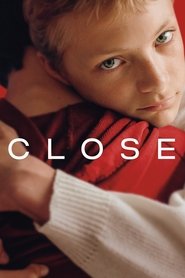In the final reckoning, this attractive-looking film is a little paint-by-numbers and does little to challenge viewers' expectations of the established narrative, but the tableaux is more than inviting — and the realism entirely naturalistic — to captivate all but the hardened cynic for the runtime. The visual symbolism gets close to being overly heavy-handed (Léo broken wing of a left hand which heals shortly after talking to Rémi's mother, as the 'life goes on' metaphor of the family's yearly flower crop…). Yet it doesn't do much beyond what you one might expect from an outline of the plot - in particular, Léo's relationship with Rémi's grieving mother (a maternity nurse, presumably so we can get eventually get to the shot of her holding a newborn) doesn't seem to develop much more than Léo's revelation, or at least it doesn't do so in words. What might have been daring would be if she couldn't reconcile with Léo. Indeed, the film is provocative enough when, early on, the first character to voice a homophobic remark is a schoolgirl, not a boy — a potentially insightful choice, given that it is, after all, young girls who are conditioned very on to detect and enforce the barriers of heteronormative behaviour.

